
Latest News Regarding
Horn of Africa
Somalia’s lack of election deal extremely serious: EU
Somalia’s lack of election deal extremely serious: EU




Source: Anadoleu Agency, Tuesday February 9, 2021
European Union also ask nation’s leaders to show leadership, not make inflammatory statements
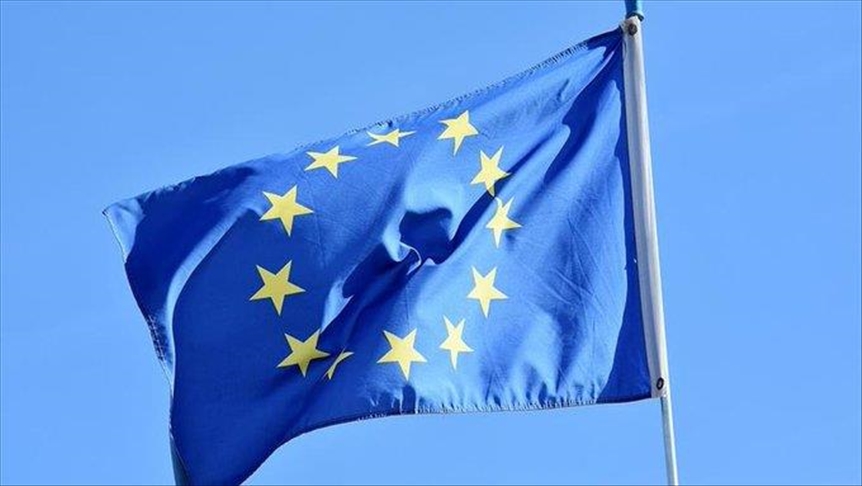
MOGADISHU, Somalia—The European Union said Monday that Somalia’s lack of agreements to conduct the next general election is extremely serious.
“It is crucial to continue to engage constructively to agree on the implementation of a national electoral process,” said EU foreign policy chief Josep Borrell in a statement.He said the current political stalemate is damaging the confidence of the bloc in the progress of Somalia.
“Any parallel or partial process or an extension of the current mandate of the institutions, which is not technical in nature, would be considered as a severe setback,” he added.
The EU encouraged Somalia’s leaders to resolve the political deadlock that threatens the country’s future and conduct elections as soon as possible.
It urged political stakeholders to show leadership and avoid statements that may incite violence.
Somali leader’s latest election conference in Dhusamareb, the capital of Galmudug State, ended without agreement and international partners have called for the resumption of talks.
UN Security Council To Hold Somalia Meeting Tuesday
UN Security Council To Hold Somalia Meeting Tuesday




Source: AFP, Tuesday February 9, 2021
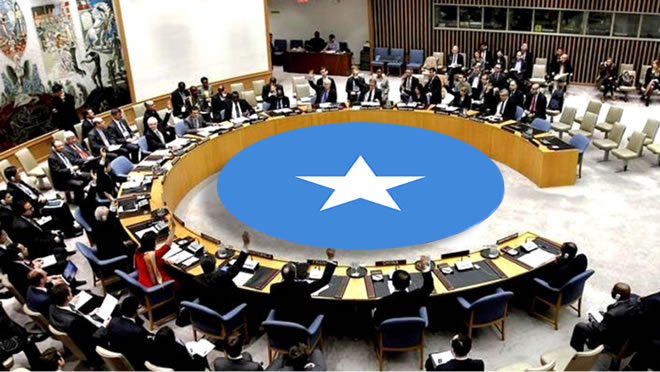
New York (AFP) – The UN Security Council will meet to discuss Somalia’s political crisis, diplomatic sources said Monday, after opposition leaders in the East African country declared the president illegitimate.
Tuesday’s closed-door meeting was requested by Britain, which is this month heading the Council, sources said.
Somalia’s President Mohamed Abdullahi Mohamed, better known by his nickname Farmajo, faced a leadership crisis Monday as his term ended with no clear path toward elections. alliance of opposition parties declared they no longer recognised his authority.
For the UN, “there is still room for Somali leaders to come together, find a political solution that will preserve the institutions that they’ve worked so hard to build,” UN spokesman Stephane Dujarric said at a press briefing.
“Dialogue among all the parties involved is essential to have a clear and broad agreement on the way forward.”
According to its monthly program, London had initially scheduled a public Security Council session on Somalia on February 22, before a renewal of the African Union Amisom mission, which expires February 28.
Farmajo and the leaders of Somalia’s five semi-autonomous federal states reached an agreement in September that paved the way for indirect parliamentary and presidential elections in late 2020 and early 2021.
But it fell apart as squabbles erupted over how to conduct the vote, and last-minute talks to salvage the agreement collapsed Friday.
Somalia’s Justice Yusuf replaced by American as ICJ president
Somalia’s Justice Yusuf replaced by American as ICJ president




Source: Hiiraan Online, Tuesday February 9, 2021
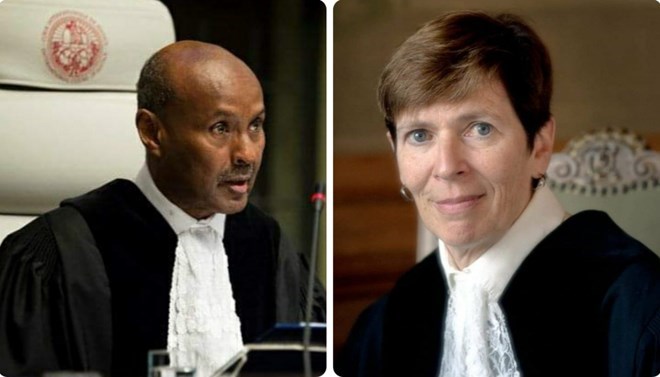
HAGUE (HOL) – Somalia’s Abdulqawi Ahmed Yusuf has been replaced as the president of International Court of Justice, the global court has said. American jurist Joan Donoghue has been elected to serve as the new president of the ICJ following elections by the 15 bench court. Russia’s Kirill Gevorgian will be the new deputy president, the court said in a statement Monday.
Justice Yusuf was elected to head the UN court in 2018. He has presided over the ongoing maritime case between Somalia and Kenya. The oral proceedings will resume mid next month.
Before joining the UN court, Donoghue served as a senior adviser to President Barack Obama and his secretary of state Hillary Clinton on international law in addition to various posts as an international law expert.
Others members on the bench are Peter Tomka (Slovakia), Ronny Abraham (France), Mohamed Bennouna (Morocco), Antônio Augusto Cançado Trindade (Brazil) and Abdulqawi Ahmed Yusuf (Somalia) and Julia Sebutinde of Uganda.
Ethiopia-Sudan Border Dispute Deadlocked
Ethiopia-Sudan Border Dispute Deadlocked
Source: Aljazeera published on 1 February 2021 an article titled “Rising Tension as Ethiopia and Sudan Deadlocked on Border Dispute” by Zecharias Zelalem.
The article provides a status report on the stalemated conflict along the Sudan-Ethiopia border where more than 60,000 Ethiopian refugees have also taken refuge from Tigray Region. 0 commentsLabels: Abdalla Hamdok, Abiy Ahmed, border conflict, Egypt, Ethiopia, GERD, refugees, Saudi Arabia, Sudan, UK
UN Secretary General Says Urgent Need to Alleviate Humanitarian Crisis in Tigray
UN Secretary General Says Urgent Need to Alleviate Humanitarian Crisis in Tigray
Source: UN News published on 3 February 2021 an article titled “Urgent Steps Needed to Alleviate Suffering in Ethiopia’s Tigray Region: Guterres.”
UN Secretary General Antonio Guterres issued a brief statement on 2 February in which he expressed “serious concern over situation in Ethiopia’s Tigray, reiterating the need for urgent steps to alleviate the humanitarian situation and extend the necessary protections to those at risk.” He also underscored the importance of the partnership between the Government of Ethiopia and the United Nations. 0 commentsLabels: Antonio Guterres, Ethiopia, Filippo Grandi, humanitarian crisis, Tigray Region, UN, UNHCR
World Food Program and Ethiopian Government To Move Forward with Humanitarian Aid in Tigray
World Food Program and Ethiopian Government To Move Forward with Humanitarian Aid in Tigray
Source: The World Food Program published on 6 February 2021 a statement titled “Joint UN-Government Tigray Mission Highlights Humanitarian Needs and Path Forward.”
The executive director of the World Food Program (WFP) and Ethiopia’s federal minister of peace recently visited Tigray Region to assess emergency food needs. The WFP estimates that 2.5 to 3 million people in Tigray require emergency food assistance. WFP and the government of Ethiopia have agreed to jointly address the problem.
Somalia leaders fail to reach deal on elections
Somalia leaders fail to reach deal on elections




Source: AFP, Saturday February 6, 2021

Mohamed Abdullahi Mohamed (known as Farmaajo), the president of Somalia, speaks in parliament in Mogadishu. Photograph: Said Yusuf Warsame/EPA
Somalia’s leaders have failed to break a deadlock over the country’s elections, with no clear path to a vote just days before the government’s mandate expires.
The fragile country is likely to miss the 8 February deadline for choosing a new president after days of negotiations between the central government and federal states collapsed on Friday.
The impasse could usher in a political crisis in the Horn of Africa nation already confronting a violent Islamist insurgency, a locust invasion and serious food shortages.
Somalia’s president, Mohamed Abdullahi Mohamed, who is seeking a second term, told parliament on Saturday his administration “made compromises on everything” to secure a last-minute agreement during talks with regional leaders in Dhusamareb, about 250 miles (400km) north of the capital, Mogadishu.“I was hoping there would have been some sort of commitment if we got together there, but unfortunately that prospect did not materialise,” said the president, who is also known as Farmaajo. “There is still hope. We have agreed to go forward and make appointments for further talks.”
The president accused Jubaland and Puntland, two of Somalia’s five semi-autonomous regions, of failing to compromise and thereby scuttling an earlier deal to hold indirect parliamentary and presidential elections in late 2020 and early 2021.
That agreement, reached in September, fell apart as squabbles erupted over how to conduct the vote, and deepened mistrust between Farmaajo and his regional rivals, most notably in Jubaland.
Jubaland’s leader, Ahmed Madobe, said his administration had negotiated in good faith but encountered hurdles and resistance all the way. “The responsibility for the failure to hold timely and consensus-based elections lies solely on President Farmaajo,” his office said in a statement.
Jubaland, a lush, relatively prosperous part of Somalia bordering Kenya, has been locked in a power struggle with Mogadishu and seen violent clashes between local and national forces.
A major bone of contention involved the electoral process in Gedo, a Jubaland region, where Madobe accused Farmaajo of “trying to control the vote from afar”. “We have previously asked the president to stop meddling with the election process and stick to his campaign, but this didn’t happen,” he said earlier.
Farmaajo blamed “foreign interference” for undermining the electoral processes. He did not name Kenya, but Somalia has repeatedly accused its larger neighbour of supporting armed groups in Jubaland, straining ties between the countries.
Kenya sees Madobe as an ally and Jubaland as a buffer between al-Shabaab militants who have staged bloody attacks across the border.
Somalia was plunged into chaos after the 1991 overthrow of president Siad Barre’s military regime, leading to years of clan warfare followed by the rise of al-Shabaab, which once controlled large parts of the country and capital.
The central government remains weak, and controls only part of the national territory. Somalia’s foreign backers, who provide the embattled government with the necessary security and financial aid to stay afloat, warned this week against any attempts at subverting the poll process.
“We underscore that any alternative outcomes, including a parallel process or partial elections, or other measures short of an agreed electoral process, would be a setback that would not obtain the support of partners,” the United Nations, African Union and other international partners said in a statement on Thursday.
Somalia had set itself the goal of holding its first one-person, one-vote ballot since 1969, a pursuit hailed by the UN as a “historic milestone”.
But frequent attacks by the Shabaab Islamist militant group, among other governance challenges, made such an exercise an unlikely prospect. Instead, the one-person, one-vote model was abandoned for a complex indirect system used in the past, where special delegates chosen by clan elders pick lawmakers, who in turn choose the president.
While the process mirrors the last election held in 2017, it was to go a bit further in terms of inclusivity, with 27,775 delegates voting – almost twice as many as last time.
EU launches over $14M new projects in Somalia
EU launches over $14M new projects in Somalia




Source: AA, By Mohammed Dhaysane
Wednesday February 3, 2020
3 projects to give Somali businesses access to credit, improve regulations
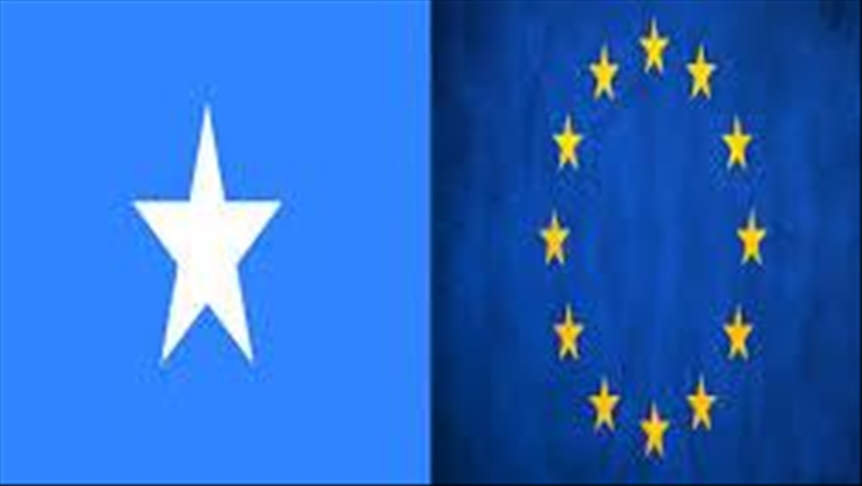
MOGADISHU, Somalia—The EU on Tuesday launched three new projects worth €11.8 million ($14.3 million) to support the private sector in Somalia.
The projects will significantly step up the EU’s engagement in Somalia as the new partnership will enable financial institutions to successfully provide relevant financing to local small- and medium-sized enterprises while supporting the investment climate, according to a statement by the EU.“Launching three private sector projects (11.8 million euro), comprising revolving funds, guarantees for loans, technical assistance, and collaboration to improve the business climate that may attract European investors to Somalia. Stability brings prosperity,” EU ambassador to Somalia Nicolas Berlanga said on Twitter.
The projects will give micro, small, and medium businesses access to credit and improve regulations that will boost the private sector in the Horn of Africa country, he added.
“We welcome the continued support from the EU to achieve a stronger and more prosperous Somalia,” Somali Planning Minister Gamal Hassan said at the launching ceremony in the capital Mogadishu.
“Our government has heavily invested in the sector with the aim of creating employment and sustainably growing the economy. These initiatives launched today by the EU support our continued resolve of providing better livelihoods to our people and our local communities,” said Somali Deputy Finance Minister Abdullahi Sheikh.
An innovative and unique partnership: WHO, Sweden and Somalia work together to improve health outcomes for all Somalis
An innovative and unique partnership: WHO, Sweden and Somalia work together to improve health outcomes for all Somalis




Source: WHO, Wednesday February 3, 2021
Swedish Ambassador, UNFPA, UNICEF and WHO joint UHC High-Level mission to Hargeisa and Garowe.
Nearly 30 years of conflict and instability have heavily marked Somalia’s recent history. Some gains are being made, but the country still faces many challenges ahead.
Somalia’s health indicators, especially for women and children rank among the lowest in the world.
Recently published statistics show that maternal mortality and deaths of children under five remain high, while female genital mutilation is still widespread. Prevalence of early marriage also contributes to high fertility rates. These issues are further exacerbated by cramped conditions in the country’s over 2 000 sites for internally displaced persons.An innovative partnership between WHO, Sweden and Somalia’s Ministry for Health was launched to address these and other persistent health problems. The partnership, which is borne out of a policy dialogue and a high-level mission by Sweden to Somalia in 2020, aims to create an independent Somali Public Health authority and to modernize the country’s health information management system.
This collaboration between Sweden and WHO in Somalia was inspired by WHO’s 2019-2013 General Programme of Work to deliver impact at the country level.
Improving health outcomes in Somalia
Sweden’s funding initiatives and active collaboration in the country, supported by WHO, are focused on promoting equitable access to health care and sexual and reproductive health and rights.
Sweden is working closely with WHO to support the establishment of an independent Somali public health authority: The National Institute of Health. This includes technical support from The Public Health Agency of Sweden.
“We strive to contribute to making the National Health Institute a centre of excellence. It is one of the priorities of WHO,” said Kyle DeFreitas, External Relations and Resource Mobilization Officer at WHO Somalia.
“We will help build the capacities of the institute, which will enable Somalia to deal more effectively with public health issues into the future, including potential disease outbreaks and pandemics,” he added.
Dr Abdifatah Diriye Ahmed, Executive Director of the National Health Institute, said the newly formed institution will be one of the most important and crucial steps towards establishing a strong health system in addition to the areas of equitable access and reproductive health and rights in Somalia. During the past three decades, the health system has been fragmented and has faced many challenges.
“With the goal of becoming the leading evidence-based centre of knowledge excellence and dissemination in research, the National Institute of Health will be the epicentre of efforts to shape Somalia’s new health care system and the future of healthy Somalis,” he said.
Sweden’s second project with WHO and the Somali Ministry of Health is a collaboration with SPIDER Centre, an institute based at Stockholm University. The initiative aims to help authorities digitalize the country’s health information management system starting in three pilot locations in Puntland, Galmudug, and Banaadir.
WHO and the National Institute of Health will also work with the SPIDER Centre to help build a state-of-the-art integrated disease surveillance and response system.
A unique partnership

UHC High-Level mission in Somalia.
“Sweden as a donor doesn’t just give financial support to WHO to carry out a project or a programme. We work together. We network together. We strive towards common goals in the health sector in Somalia. We make resources available and we use them to push things together in the right direction,” says Daniel Magnusson, Senior Programme Manager at the Somalia Section at the Swedish Embassy in Nairobi.
A critical feature of the partnership focuses on the exchange of expertise which will happen through the secondment of personnel. An experienced senior professional will join WHO Somalia to, among other duties, focus on supporting the National Institute of Health and collaboration with SPIDER Centre. Another expert consultant will join at a later stage.
After the first stage, the team will assess their progress and make any necessary adjustments.
A cohesive UN system
“Sweden believes in a UN system that works together. Our view of health sector development in countries like Somalia is that there needs to be strong collaboration and coordination between the different multilateral agencies like WHO and bilateral actors like Sweden, combined with a strong engagement with the government at different levels,” explained Daniel.
Building a stronger primary health care system is crucial in creating a brighter future for the people of Somalia and is therefore part of WHO’s main focus.
“A strong primary health care system can ensure equitable access to health care and rights to health including reproductive and sexual health for women and other marginalized groups. “It is an investment for managing health security threats at the local level before they become a national threat or an epidemic,” says Dr Mamunur Malik, WHO Representative in Somalia.
Despite the long road ahead, the collaboration between Sweden, WHO and the Somali Ministry of Health is one significant step towards ensuring that no one in Somalia will be left behind in the journey towards health for all.
International Implications of Ethiopia Conflict
International Implications of Ethiopia Conflict
Source: The Middle East Institute published on 27 January 2021 an analysis titled “Ethiopia’s Domestic Problems Risk Becoming International” by Mirette F. Mabrouk.
The author argues that while Ethiopia’s internal situation is troubling enough, the potential for the conflict to spill over borders is even more disturbing. 0 commentsLabels: Abdel Fattah el-Sisi, Abiy Ahmed, Egypt, Eritrea, Ethiopia, GERD, human rights, refugees, Sudan, Tigray Region, TPLF, UAE, US
Call for US To Reengage in Ethiopia
Call for US To Reengage in Ethiopia
Source: World Politics Review published on 1 February 2021 a commentary titled “The Case for Reengagement in Ethiopia” by Cameron Hudson, Atlantic Council.
The author argues it it time for the United States to engage in Ethiopia using both carrots and sticks. It is also time to put Ethiopia on the UN Security Council agenda. 0 commentsLabels: Abiy Ahmed, AU, Biden administration, Eritrea, Ethiopia, EU, human rights, humanitarian crisis, refugees, sanctions, Sudan, Tigray Region, TPLF, UN, US
Top US lawmaker vows to reverse Trump’s ‘insulting’ Africa policy
Top US lawmaker vows to reverse Trump’s ‘insulting’ Africa policy




Source: Aljezeera, By Joseph StepanskyTuesday February 2, 2021
Gregory Meeks, chair of House Foreign Affairs Committee, says he will seek to move Africa to ‘the front burner’.
![Representative Gregory Meeks, the incoming chairman of the influential House Foreign Affairs Committee, has said he will prioritise US-Africa relations [File: Bebeto Matthews/The Associated Press]](https://www.aljazeera.com/wp-content/uploads/2021/02/AP_20110559745820.jpg?resize=770%2C513)
Representative Gregory Meeks, the incoming chairman of the influential House Foreign Affairs Committee, has said he will prioritise US-Africa relations [File: Bebeto Matthews/The Associated Press]
The new chairman of the US House Foreign Affairs Committee has pledged to put sub-Saharan Africa “on the front burner” of United States foreign policy, including through an expansion of diplomatic, humanitarian and commercial activities in the region.
Congressman Gregory Meeks, who was elected as head of the influential committee in December, said on Monday that the US Foreign Service must be bolstered during President Joe Biden’s administration.
Former President Donald Trump’s tenure in the White House saw a depletion of diplomatic staff across the continent – and perhaps most notably, the top ambassador post to Africa, assistant secretary of African affairs, remained vacant for nearly two years under Trump.“We have an opportunity to redefine America’s foreign policy and to do so in a way that makes it clear that America is back at the table,” Meeks said during an online event hosted by the Center for Strategic and International Studies (CSIS).
“This is especially true in Africa, which the previous administration spent the last four years viewing only through the prism of competition with China and Russia.” Meeks, the first Black legislator to fill the committee role, is considered a longtime supporter of Africa engagement and will join Democratic Senator Bob Menendez, the soon-to-be minted chair of the Senate Foreign Affairs Committee, in shaping US foreign policy legislation.
Beyond influencing which bills move forward in the two US legislative chambers, the committees oversee investigations and programmes related to US foreign policy. Their mandates include foreign aid, treaties, military deployments, international trade, arms control, and war powers.
“The previous administration’s focus on great power competition reduced Africa to a pawn in a great game,” Meeks said. “And frankly, this approach was insulting because it assumed that Africans lacked any agency for how they affected, and were affected by, foreign affairs.”
‘Inflection point’
Meeks was pushed on Monday to lay out his plan on two pressing issues: the Ugandan presidential election, which saw Yoweri Museveni win a sixth term amid claims of voter fraud and a crackdown on opposition leader Bobi Wine, and a crisis in Ethiopia’s conflict-hit Tigray region.
Museveni has long been a close military ally of the US in its fight against “terrorism” in the region and receives hundreds of millions of dollars in assistance every year. The US State Department recently told the New York Times it is considering “a range of targeted options, including the imposition of visa restrictions” against Museveni for the handling of the vote.
But Ugandan activist Rosebell Kagumire told Meeks the US needs to work to assure a peaceful transfer of power.
“I think that looking at [Museveni] as [a US] partner must come with this hard conversation that asks, ‘Where is your country going? Your people need an election, not a ritual,’” she said during Monday’s event.Meeks said the US “is rapidly approaching an inflection point at which we need to think critically about how we can support the will of the Ugandan citizens for an inclusive democracy and partner on good governance and accountability”, but he did not elaborate on any concrete steps.
Ethiopia conflict
Tsedale Lemma, an Ethiopian journalist, urged Meeks to use “every leverage available” to ensure an end to hostilities in Ethiopia’s Tigray region and the distribution of humanitarian assistance to civilians.
A government crackdown on the Tigray Liberation Liberation Front (TPLF) has led to the displacement of about two million people from the region, the reported deaths of hundreds of civilians killed, and allegations of widespread human rights abuses.
In a statement on Monday, Norwegian Refugee Council Secretary General Jan Egeland said meaningful humanitarian operations have still not begun in the region. “In all my years as an aid worker, I have rarely seen a humanitarian response so impeded and unable to deliver in response for so long, to so many with such pressing needs,” Egeland said.
Lemma told Meeks the US must push for the Eritrean military’s withdrawal from Tigray. The Department of State has called on Eritrean soldiers to leave, with both Eritrea and Ethiopia denying they are working in coordination in the region.
Lemma also called for a “UN-mandated, politically insulated and independent investigation into the atrocities that took place”.
Meeks said the US must use its “bully pulpit” to get countries to push for a ceasefire that would grant humanitarian access, while saying that “an independent investigation has to occur”. He also promised to use his committee to “put a spotlight” on the conflict.
Biden policy
Political analysts said many questions remain about how the Biden administration will approach Africa, however.
Some were optimistic the continent will gain some benefit from Washington’s re-engagement with international organisations, while others believe Africa will not be a priority amid other more pressing issues, such as the COVID-19 pandemic.
Some of Biden’s early presidential actions have included the end of Trump’s travel ban on several Muslim-majority countries – which included Somalia, Nigeria, Sudan, Eritrea, Egypt, Libya and Tanzania – and the lifting of the Global Gag rule, which limited aid to organisations that provide abortion counselling or literature and which disproportionately affected Africa.
But it will be a break from the Trump administration, which ended a period of increased US-Africa engagement that began under the administration of former President Bill Clinton.
While US aid remained relatively stable, trade dropped considerably, Francis Owusu, a professor at Iowa State University, and Padraig Carmody, a professor at Trinity College Dublin, wrote on The Conversation news website. They dubbed Trump’s approach “malign neglect”.Instead, Meeks said he hoped the US would expand its reach beyond urban centres and called for opening consulates in Mombasa, Kenya, Cairo, Egypt, and Goma. He also said he is exploring “establishing dedicated US Embassy country teams for the regional economic communities, separate from the bilateral missions “.
Mogadishu Hotel Attack Death Toll Rises to 15
Mogadishu Hotel Attack Death Toll Rises to 15




Source: VOA, Tuesday February 2, 2021
A soldier walks past rubble in the aftermath of an attack on the Afrik Hotel in Mogadishu, Somalia, Feb. 1, 2021. Al-Shabab claimed responsibility for the deadly assault.
WASHINGTON/MOGADISHU – The death toll from Sunday’s assault on a hotel in Somalia’s capital has risen to 15, with at least 20 others injured, according to a police spokesman and medical officials in Mogadishu.
The dead include four assailants in addition to 11 victims, say security officials.
The militant group al-Shabab claimed responsibility for the attack. A well-known top retired general, Mohamed Nur Galal, and young couples on their honeymoon were among those killed.
“The newly married young couples came from abroad and they were having their honeymoon time at the hotel. We were told around 3:00 am local time on Monday that their dead bodies were found inside their hotel room,” said Farah Abdirahman, the uncle of one of the women killed.
The attack at one of Mogadishu’s popular hotels, the Afrik Hotel, began with a car bomb explosion and then al-Shabab gunmen dressed in Somali military uniforms stormed the building.
The four al-Shabab assailants died during an operation in which the security forces tried to flush the militants out of the building, police spokesman Sadiq Aden Ali told reporters.
Three of the militant gunmen were shot by the police and one blew himself up, survivors and witnesses at the scene told VOA Somali.
Security forces were able to rescue dozens of people from the hotel during the siege.
Among the survivors was a VOA reporter, Abdikafi Yusuf Aden, who was inside the hotel when the militants stormed.
“There was confusion and thick smoke rose up after the blast occurred. People were jumping down over the wall as we ran for our lives,” Aden said.
Footage circulated on social media showed hotel residents including women jumping from the windows to escape the attack.
Around midnight Sunday Somalia’s government announced its security forces ended the seven-hour siege.
Somali President Mohamed Abdullahi Farmaajo and the country’s prime minister, Mohamed Hussein Roble have both condemned the attack.
In a statement on Monday, James Swan, special representative of the U.N. secretary-general for Somalia, also denounced the attack.
“We are appalled by this reprehensible and senseless attack on a venue frequented by innocent civilians, and condemn it in the strongest terms,” he said.
Heavily guarded area
The hotel, which is known to be a gathering place for Somali government officials and people from diaspora is located along a strategic road linking downtown Mogadishu with the international airport.
Politicians, lawmakers, and senior civil servants often go to the hotel for coffee and political conversations.
Analysts question how the militants were able to target the hotel even though it is in a heavily guarded area.
“There has been a security alert before the attack. Therefore, the security forces and hotels were supposed to be very vigilant but that did not happen,” said former deputy of Somalia’s National Intelligence and Security Agency, Abdisalan Yusuf Guled.
“Most of the roads leading in and out of government officials and hotels have sealed with road blockage before for security reasons and to prevent al-Shabab attack, but it seems those measures did not help,” Hussein Moalim Mohamud, Somalia’s former national security adviser told VOA Somali. “The government security officials have to respond how al-Shabab is still able to attack such a heavily guarded area.”
Former intelligence officer Colonel Abdullahi Ali Maow says the militants carry out such attacks when there is a security negligence and the country’s leaders get busy into political disputes.
“Al-Shabab always takes advantage of when the country’s leaders are busy with politics. And this time when there is a strong political dispute on the elections due to hold next month their aim is to show presence, and that they are still capable of attacking wherever they want in the city.”
Sunday’s attack comes as the country’s top leaders and the leaders of the regional states convene in Dusamareb, capital of the Galmudug regional state, for talks that will focus on a delay in the timetable of the upcoming presidential and parliamentary elections and solving political disputes that caused the delay.
The attack also comes just weeks after the U.S. said they completed withdrawal of some 700 U.S. troops who had supported the government’s fight against al-Shabab.
Falastin Iman in Washington and Hassan Qoyste in Mogadishu have contributed this report.
The European Union hands over 9 refrigerated trucks to Somali coastal communities as part of the EU funded “No Piracy” fisheries project
The European Union hands over 9 refrigerated trucks to Somali coastal communities as part of the EU funded “No Piracy” fisheries project



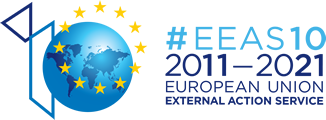
Source: European Union External Action Service, Friday January 29, 2021
Mogadishu, 28/01/2021—Today, the European Union and its implementing partner FAO handed over a total of 9 refrigerated trucks as well as 6 solar powered ice machines as part of the project “No Piracy: Alternatives for Youth Living in Coastal Communities of Puntland, Galmudug and Mogadishu”.
“Revitalizing the blue economy is a central component of the EU’s work in Somalia”, said the EU Ambassador to Somalia, Nicolas Berlanga. “Helping modernize and improve the fisheries sector will not only better the livelihood opportunities of young people and women, it will also help reduce illegal activities such as piracy. Peace and stability, a sense of compromise among leaders, is a prerequisite for this assistance to be successful”.
“Somalia has a vast ocean which is underexploited with the potential to greatly improve the lives and livelihoods of Somali’s citizens and the prosperity of the nation as a whole”, said the Minister of Fisheries and Marine Resources, Hon. Abdilahi Bidhan Warsame. “Somali as a coastal nation stands to gain the most from a robust fisheries sector in order to maintain sustainable economic development”
“The vehicles will meet the demand in remote fishing areas and will create a new opportunity for the fish to be brought to the local markets,” said Abdirashid Mohamed, Director General of the Galmudug Ministry of Fisheries. “They will also contribute to good fish production, which was previously low because of the lack of transportation vehicles. Landlocked cities will also have access to fresh, low-cost fish,” he added.
“The refrigerated trucks will provide immediate, sustainable mobile fish storage and delivery capacities that will contribute to creating jobs for youth in Somalia’s Indian Ocean coastal communities by strengthening the fisheries value chain”, underlined Etienne Peterschmitt, the FAO Representative for Somalia.
The project, that started in 2016, is of the amount of €5.3 million and is implemented by FAO Somalia together with local partners such as the Federal and State Ministries of Fisheries and Marine Resources (MFMR), Adi Associates, City University (Mogadishu), DEH Relief Somalia, Help Leads to Hope (HLH), One Earth Foundation, and Puntland Livestock Professional Association (PULPA).
Background
At nearly 3 thousand kilometers, Somalia has the longest coastline in mainland Africa with a huge potential for economic and job opportunities. Somalia’s fisheries sector is currently estimated to account for only about one percent of Somalia’s Gross Domestic Product.
The “No Piracy: Alternatives for Youth Living in Coastal Communities” project contributes to the creation of sustainable skilled employment among the youth living in coastal communities by increasing access to currently untapped marine fisheries resources through a number of activities.
So far, a total of 27 new fishing vessels – built in Somalia to international standards with improved safety, fuel efficiency and fish storage facilities – have been provided and over 200 fishermen have received mentoring and training support in a range of fishing skills from the Lead Fishermen, mainly representatives of fishing co-operatives. Also benefiting from the project are women from female households who have received material support and training to add value to their production.
The provided vehicles will be operated under Public Private Partnership (PPP) arrangement with Somali fishing co-operatives or fishing companies. They will support the project’s objectives in creating income generating opportunities by allowing communities to bring their fresh fish safely to the market. This activity is key for creating job opportunities for youths that are at risk of being recruited into piracy.
Anger in Somalia as sons secretly sent to serve in Eritrea military force
Anger in Somalia as sons secretly sent to serve in Eritrea military force




Source: Reuters, Friday January 29, 2021
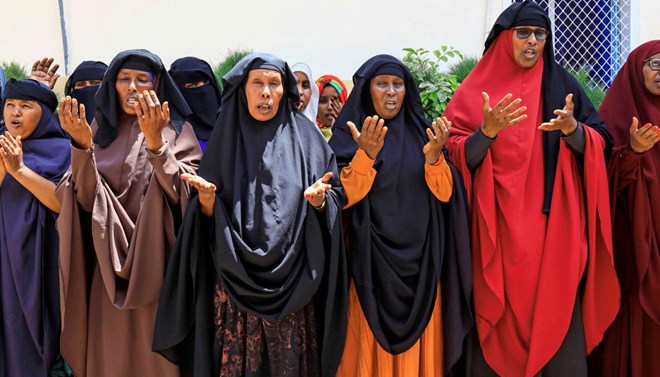
Somali women whose sons are missing after they were taken for military training, pray after a Reuters interview in Mogadishu, Somalia January 20, 2021. REUTERS/Feisal Omar
MOGADISHU (Reuters) – Ali Jamac Dhoodi thought his son was working as a security guard in Qatar, helping prepare for next year’s soccer World Cup. Then one day last April, officials from Somalia’s National Intelligence Agency arrived with $10,000 in cash.
They told him his son had died – not in Qatar, but in Eritrea, one of the world’s most secretive countries.
“They showed me a picture from their WhatsApp and asked me, ‘do you know this picture and his full name?’ I said, ‘yes he is my son,’” Dhoodi, 48, told Reuters. “They said to me ‘your son died’. I cried.”1They gave him the money, and told him not to ask questions.
Ali’s son was one of three young Somali men whose families told Reuters they had been recruited by Somalia’s federal government for jobs in Qatar, only to surface in Eritrea, where they were sent to serve in a military force against their will. Two other families said their sons had simply disappeared.
The apparent secret recruitment of young Somali men for a fighting force in Eritrea is stirring public anger in Somalia, a poor country where opportunities to work abroad are eagerly sought. Protests erupted last week in the capital Mogadishu and in the towns of Guriel and Galkayo over the missing recruits.
Reports that Eritrean forces have taken part in fighting that broke out in November last year in neighbouring northern Ethiopia – which Eritrea and Ethiopia strongly deny – have led some Somalis to worry their sons may have been sent there.
Asked if Eritrea had recruited Somalis, trained them or sent them to Ethiopia, Eritrean Information Minister Yemane Meskel told Reuters: “This is ludicrous … There is massive disinformation floating around.”
Somali government spokesman Mohamed Ibrahim and Information Minister Osman Dube did not respond to requests for comment on the Somali government’s apparent role in the recruitment, but Ibrahim said no Somalis had been sent to Ethiopia.
The leaders of Somalia, Ethiopia and Eritrea have been drawing closer together since 2018, after a change of leadership in Ethiopia. Ethiopia and Eritrea, once archenemies, signed a peace deal and have regular high level visits. Somalia – which once accused Eritrea of supporting Islamist rebels – now has friendly relations with its president.
‘A BULLET IS THE REPLY’
Hussein Warsame said his son Sadam, 21, had been recruited for a security job in Qatar in October, 2019. Nothing was heard from him for more than a year. Finally, last November, he phoned from Eritrea.
“We were all shocked to land in Eritrea. We thought we were being flown to Qatar,” he quoted his son as telling him. “Dad, there is no life here, I have not seen food save a lump or slice of bread since I left Somalia in 2019, and when recruits demonstrate or reject orders, a bullet is the reply.”
Sahra Abdikadir, whose son Aqil Hassan Abdi disappeared in 2019 under similar circumstances, told Reuters that he had called in January and said he was in a camp in an unknown location in Eritrea.
Eritrea, a heavily militarised society, has never held elections, has no independent media and forces its citizens into indefinate government service. Former guerrilla leader Isaias Afwerki has been president since 1993.
Somalia has had only limited central government rule since 1991.
Both countries have a history of decades of conflict in the Horn of Africa region, often involving their much larger neighbour Ethiopia.
A regional security analyst who asked not to be identified told Reuters he had learned from conversations with Somali security officials that about 1,000 Somalis had been recruited and taken to Eritrea in at least three groups. One group had returned to Somalia, the second group was unreachable and the third was still in Eritrea.
Reuters was unable to confirm those details.
Reporting by Abdi Sheikh; Additional reporting by Omar Mohammed and Katharine Houreld; Writing by Omar Mohammed; Editing by Peter Graff
UN urges consensus as deadline for Somalia vote looms
UN urges consensus as deadline for Somalia vote looms




Source: AFP, Thursday January 28, 2021
James Swan, Special Representative of the Secretary-General and Head of the United Nations Assistance Mission in Somalia, briefs the Security Council meeting on the situation in Somalia. November 21, 2019. UN Photo/Rick Bajornas
UN special envoy James Swan on Wednesday warned that Somalia was approaching “unpredictable territory” should its political leaders not broker an urgent settlement over how to proceed with delayed elections.
Somalia was scheduled to hold indirect parliamentary and presidential elections before February 8 but the process has been derailed by political disagreements between the foreign-backed central government in Mogadishu and its federal states.
Swan said it was “unrealistic” at this point to expect the election to occur on time, with a number of key procedural steps already months behind schedule.The UN special representative said the focus instead was on breaking the political deadlock, and reaching a consensus that avoids further instability in a fragile country already wracked by clan violence and a deadly Islamist insurgency.
“I think there is concern that going beyond February 8 without a clear agreement takes us into unpredictable territory,” he said during a virtual press briefing in Mogadishu on Wednesday.
“We really are seeking to… encourage every opportunity by the Somali leadership to overcome these differences, and take action really in the coming few days, so that answers can be found — solutions can be found — well before February 8.”
President Mohamed Abdullahi Mohamed, better known by his nickname Farmajo, and Somalia’s five regional leaders on September 17 reached an agreement that abandoned a promised one-person, one-vote ballot but offered a common path forward for elections.
Somalia had set itself the goal of holding its first fully democratic, one-man one-vote election since 1969 — as opposed to a complex indirect system in which special delegates pick lawmakers who then vote for the president.
– ‘Climate of mistrust’ –
But disagreements lingered over the multi-stage process.
Critical deadlines — including for the formation of electoral committees and the selection of upper and lower house members, who in turn choose the president — came and went.
Swan said he did not know how long the process may take, but that the international community was opposed to a parallel or alternative election process outside what was agreed on September 17.
He said every effort was being made to broker dialogue but the impasse remained and time was running out.
“I think more broadly, sadly, there is a current climate of mistrust among many of Somalia’s top political leadership. The challenge to some degree is how to overcome that mistrust at this time,” he said.
An alliance of opposition presidential candidates said Wednesday they were committed to finding a political settlement before February 8 but urged the federal government to start “honest negotiations”.
They accused Mogadishu of an “inability to engage in or call for a national dialogue with political stakeholders to discuss and reach common ground”, and warned against holding partial elections.
The UN had described the pursuit of one-person, one-vote elections as a “historic milestone” on Somalia’s path to full democratisation and peace after decades of war and violent instability in the Horn of Africa nation.
But observers had warned that such a goal was unlikely.
The problems include tensions with the states, technical aspects such as voter registration and security challenges posed by the Al-Qaeda-affiliated Al-Shabaab militant group.
The fragile central government, chaired by Farmajo, controls only a part of Somali territory and relies on an international peacekeeping force to confront a violent insurgency from Al-Shabaab.
Farmaajo signs resolution allocating Mogadishu 13 seats in the Senate
Farmaajo signs resolution allocating Mogadishu 13 seats in the Senate




Source: Hiiraan Region, Thursday January 28, 2021
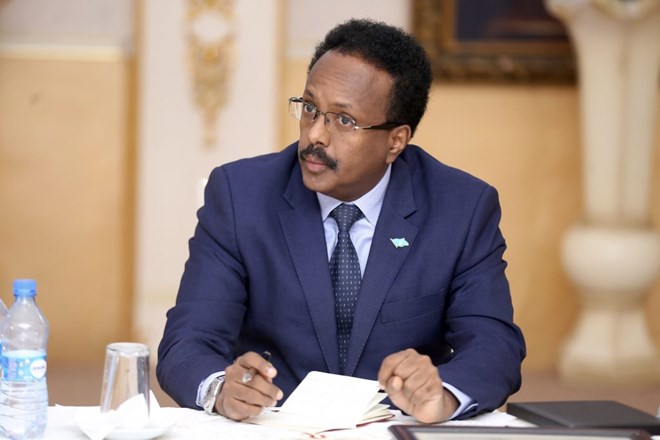
MOGADISHU (HOL) – President Mohamed Farmaajo has signed a resolution allocating 13 seats to Banaadir region in effect expanding the Senate from 54 to 67 members.
Villa Somalia said Thursday the president assented to a resolution passed by the Lower House last June which sought to create representation for Banadir region which encompasses the capital Mogadishu in the Federal Parliament. Banaadir region which is the most populous region in the country has been without representation in the Senate. Farmaajo appealed to the Lower House last year to pass a resolution which would allow Banaadir’s representation in the Senate.
However, the signing of the resolution today which happened the same day both Jubbaland and Puntland announced their respective electoral teams is likely to fuel more battles with the two states which had vehemently opposed the resolution.
The presidents of the two states today called for a joint conference in Mogadishu bringing together the Federal Government and the Federal Member States to iron out pending issues ahead of the elections
Turkey OKs force deployment extension in Gulf of Aden
Turkey OKs force deployment extension in Gulf of Aden




Source: AA, Wednesday January 27, 2021
Parliament ratifies motion extending deployment through February 2022
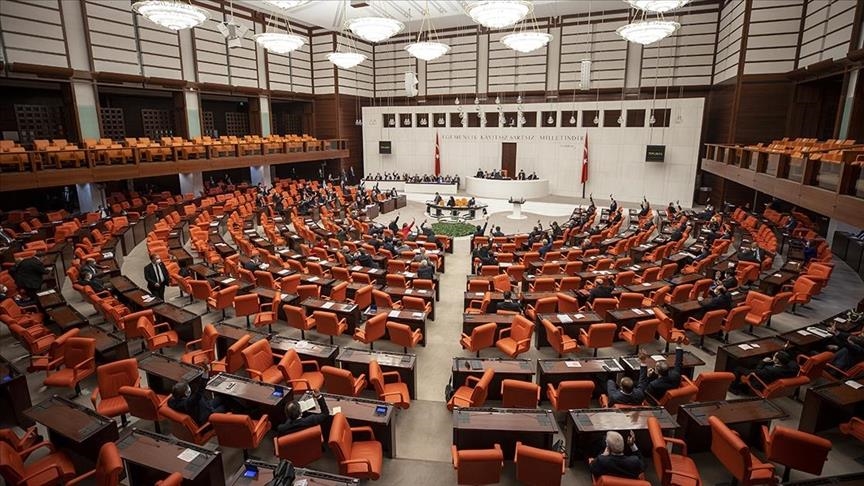
ANKARA—Turkey’s parliament on Tuesday approved an extension of Turkish forces serving in the Gulf of Aden, Somalia, and the Arabian Sea.
It ratified a motion extending the authorization of the deployment until Feb. 10, 2022.Ads By Since it was first approved by parliament in 2008, the motion for the deployment has been extended 13 times.
The Gulf of Aden, near Yemen and close to the Bab el-Mandab Strait, the world’s fourth-biggest chokepoint for oil transit, is a strategic energy route for Mideast crude oil.
The Arabian Sea and the Horn of Africa country of Somalia is adjacent to the gulf and the strait.
Departing US Envoy Warns Ethiopia Against Violence
Departing US Envoy Warns Ethiopia Against Violence




Source: VOA, Wednesday January 27, 2021
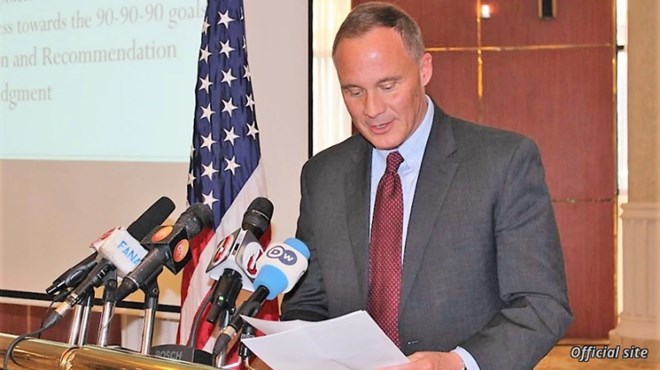
Calling Ethiopia “the critical actor in Horn of Africa stability,” outgoing U.S. Ambassador to Ethiopia Michael Raynor voiced confidence in a strengthened bilateral relationship but warned that violence – especially in the northern Tigray region – threatens the country’s progress.
“We remain concerned about ethnic violence around the country and the threat it poses to achieving the country’s potential,” Raynor said of Ethiopia, speaking at a press conference Monday in Addis Ababa, the capital.
It was Raynor’s final news briefing as ambassador, a post he has held since September 2017. He has focused on Africa for many of his 30-plus years as a diplomat.
Rivalries among some of Ethiopia’s 80 ethnic groups have spawned deadly violence, including the Jan. 12 killings of more than 80 civilians in Metekel, a town in the western Benishangul-Gumaz region, the Associated Press reported, citing information from the Ethiopian Human Rights Commission.
Raynor said the U.S. government also is “particularly alarmed by the ongoing situation in Tigray,” where Ethiopian federal forces launched a military operation in early November to put down a rebellion by regional forces of the Tigray People’s Liberation Front. Ethiopia’s government said that it had regained control of the region by late November, but reports of extrajudicial killings and other sporadic violence have continued to filter out.
the conflict’s outbreak, more than 58,000 have fled northern Ethiopia for neighboring Tigray, the International Organization for Migration reported Monday. While thousands are believed to have been killed and many more internally displaced, numbers are difficult to verify because of limited communications with, and access to, Tigray. The United Nations estimates that roughly 4.5 million people in Tigray desperately need food, medicine and other basics, and U.N. agencies have criticized Ethiopian authorities for blocking humanitarian aid.
“After almost three months, we’re still not seeing enough humanitarian assistance reach the most vulnerable areas,” Raynor told journalists. “Much more needs to be done, and urgently, to ensure humanitarian organizations – both Ethiopian and international – have full and secure access to the region to provide lifesaving support to the millions of people who are suffering.”
The U.N’s special representative on sexual violence, Pramila Patten, last week released a statement that she was “greatly concerned by serious allegations of sexual violence” in the region.
Raynor acknowledged that concern, saying the U.S. government continues “to call on all parties to cease any hostilities, ensure the protection of all civilians in Tigray, including refugees and humanitarian workers, and to uphold international human rights and humanitarian law.”
He also brought up the U.S. assessment that soldiers from Eritrea were helping Ethiopian federal forces in Tigray, despite Ethiopian authorities’ denials.
“We continue to be troubled by the activities of Eritrean actors in the Tigray region,” Raynor said, “and we continue to call for an immediate halt to — and independent investigations of — all credible reports of atrocities. sexual violence, human rights violations of all kinds in Tigray and other places.”
Improved bilateral relations
Raynor said that when Abiy Ahmed became prime minister in April 2018, replacing Hailemariam Desalegn after 23 years and introducing an array of reforms, “there was a fundamental reset, a realignment of core values fully in sync with U.S. core values, both in terms of economic opportunity and job creation and in terms of political space and respect for rights. So that formed a strong basis for us to expand our engagement.”
During his tenure as ambassador, Raynor said, the U.S. government “brought well over $3 billion” to support Ethiopia’s governance, development and humanitarian priorities. These range from enhancing the country’s food security and health systems to reforming judicial activities and updating economic policies to encourage private investment.
Raynor also observed that Ethiopia’s ability “to focus on our areas of partnership has been strained by some degree due to the rate of ethnic tensions and Ethiopian-on-Ethiopian violence and certainly the current Tigray crisis. But by and large I feel very optimistic about the trajectory we have been on and that my successor will be able to build upon.”
A successor has not yet been named.
“This is a pivotal time for Ethiopia,” Raynor said. “What Ethiopia does in the coming months — particularly in promoting democracy, organizing free and fair credible elections this year, protecting basic human rights including freedom of the press and freedom of expression, resolving conflict and addressing ethnic tension, maintaining regional harmony and promoting economic opportunity — will impact this country’s prospects for generations to come.”
Somalia says 11 killed, 100 arrested in fierce clashes near border town
Somalia says 11 killed, 100 arrested in fierce clashes near border town




XINHUA: Tuesday January 26, 2021![Both sides have claimed victory but people in the town said fighting continued and some people had begun to flee [FILE: Abdiqani Hassan/Reuters]](https://www.aljazeera.com/wp-content/uploads/2020/09/122f1f589f3e460b8642af726e76c2c2_18.jpeg?resize=770%2C513)
Both sides have claimed victory but people in the town said fighting continued and some people had begun to flee [FILE: Abdiqani Hassan/Reuters]
MOGADISHU, Jan. 25 (Xinhua) — At least 11 people were killed and several others injured following fierce fighting in the town of Beled Hawo between Somali forces and militants of the federal territory of Jubbaland.
Mohamed Ibrahim Moalimuu, government spokesman said the Somali forces arrested nearly 100 fighters who are loyal to fugitive Abdirashid Janan, the security minister in Jubbaland.
Eleven people, including nine civilians, were killed during the crossfire. A government soldier and his bodyguard were also killed during the fighting by this militia group which launched a cross-border attack at midnight, Moalimuu told Xinhua on the phone.7Both sides have claimed victory but independent sources in the town said fierce fighting continued during the day sparking displacement in the town.
“Our forces have also arrested almost 100 fighters,” Moalimuu said, adding that the Somali National Army (SNA) troops are now in full control of the town after they successfully repulsed the attack which was staged by the fighters loyal to the Jubbaland state.
Moalimuu said the death toll could rise since several people including soldiers were injured during the fighting.
Mogadishu has accused neighboring Kenya of backing the militia who launched the attack on Sunday night.
However, Kenya has repeatedly denied the accusations and instead sent a Diplomatic Note to the chairperson of the African Union Commission, calling for cessation of hostilities in neighboring Somalia.
Osman Dubbe, minister for information had earlier said calm had been restored in the city after SNA forces arrested more than 100 fighters.
“Nearly 100 people have been arrested by the army, but we are not allowed to disclose it due to international prison rules,” he said, adding that the army was always ready for any attack by the enemy.
He called on the fighters to surrender to the government and not to be misled again, noting that the government will intensify patrols along the border to ensure peace prevails.
“We will not surrender. We will defend this country. Not a single inch of the country will be invaded by insurgents. We have seized a lot of weapons. Investigations are underway to find out where they are going and who sent them,” Dubbe said.

